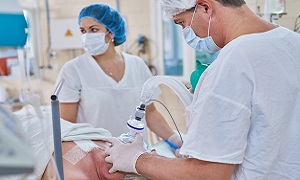Best TAVI / TAVR procedure doctors in India
- Cardiologist, Hyderabad, India
- Over 25 Years Experience
- Apollo Hyderabad
Profile Highlights:
- With an experience of over 25 years, Dr. A Sreenivas Kumar is a well-known cardiologist in Hyderabad, who is presently working as a Senior Consultant Cardiologist at Apollo Health City, Hyderabad.
- Dr. Kumar is known for his expertise in complex coronary interventions and challenging procedures like TAVI/TAVR (Transcatheter Aortic Valve Implantation/Replacement).
- Over the course of his career, he has successfully performed more than 100 TAVIs/TAVRs and over 15,000 angioplasties.
- At Apollo Health City, Dr. Kumar provides a wide range of Cardiological services. Barth syndrome, acute aortic dissection, cardiac arrhythmias, dilated cardiomyopathy, heart transplantation, and the prevention of cardiovascular disease, are just a few of his specialties.
- In addition, Dr. Kumar has an outstanding academic background. He is credited for securing the second rank in the Andhra Pradesh MBBS Entrance Exam.
- His research on the clinical characteristics of adult patients with sickle cell disease earned him the esteemed S.R. Rao Research Award for Best Thesis in M.D. General Medicine, further solidifying his already impressive resume.
- He is also the Founder Editor of Post Graduate Medical Clinics of Osmania, the National Medical Journal.
- Interventional Cardiologist, Hyderabad, India
- Over 17 Years Experience
- Apollo Hyderabad
Profile Highlights:
- With more than 17 years of vast expertise, Dr. Gokul Reddy Mandala is one of the best interventional cardiologists in Hyderabad.
- As a renowned expert in Cardiology, Dr. Gokul Reddy Mandala currently practices at Apollo Health City, Jubilee Hills in Hyderabad.
- With degrees in DM, MD, and FACC, he provides a wide range of services to treat different cardiac diseases.
- His speciality primarily lies in treating heart disorders like chest pain, heart failure, aortic heart diseases, pulmonary hypertension, coronary artery disease, peripheral artery disease, structural heart disease, chronic total occlusion, myocardial infarction (heart attack), etc.
- Throughout his career, Dr. Mandala has carried out numerous cardiac interventions like Coronary Angioplasty with stenting, Peripheral Angioplasty, Renal Angioplasty, Structural heart disease interventional therapies like, PBMV, PDA, ASD, and VSD device closures.
- Dr. Mandala makes sure his patients receive the best cardiac care possible, whether it is for preventative care, diagnostic screenings, or the treatment of cardiovascular emergencies.
Best Hospitals for TAVI/TAVR in India
TAVR Procedure
Transcatheter aortic valve implantation/replacement (TAVI/ TAVR) is one of the magnificent developments in medical science in recent times. With TAVR procedure, patients having aortic stenosis are able to get the valve replaced without having to undergo a open-heart surgery as was the case before.
In TAVR, a Transcatheter Aortic Valve is inserted using a catheter into the heart through a large blood vessel in your groin or through a small incision in your chest.
The valve is normally made of natural tissue from the heart of either a cow or a pig. The natural tissue is re-engineered and attached to a flexible expanding mesh frame. In order to implant it into the heart, the valve is squeezed around or inside a catheter. The catheter is then inserted and guided to the aortic valve opening in your heart where it is implanted over your existing valve. Once the new valve is implanted, the catheter is removed. The new valve starts working right away.
(Explained by Dr. Praveen Chandra, Medanta-the Medicity, India)
What conditions is TAVR used for?
- TAVR is used for the treatment of Aortic Stenosis. In aortic stenosis, the aortic valve opening is narrowed. As a result, the valve will not open fully which makes the heart work harder & reduces blood flow to the body.
- TAVR may also be an option if the patient has a non-functioning biological valve that was previously inserted to replace the aortic valve.
What tests are done to determine if I am right candidate for TAVR?
To determine your best eligibility for TAVR procedure, you may be required to undergo the following tests:
- Electrocardiogram
- Echocardiogram
- CT Scan and
- Angiogram
TAVR Procedure explained
Before the procedure
- Do not eat at least 6 hours before the procedure.
- Stop taking diabetes & blood thinning medications at least 3 days before the procedure.
- Do not drink any clear fluids like water and tea without milk 2 hours before the procedure.
During the procedure
The patient is given general anesthesia. A balloon catheter is inserted into an artery through groin or collar bone, which is advanced into the heart and placed within the opening of the aortic valve. The balloon is gently inflated so that the replacement valve is pressed in the place of the native aortic valve or a new aortic valve is implanted using metal mesh tube. When the valve is securely placed, the catheter is withdrawn from the blood vessel.
After the procedure

- The patient is monitored closely, in the hospital for any possible after effects of the surgery.
- TAVR patients are usually discharged from the hospital within three to five days, after the procedure.
- The patient is prescribed blood-thinning medications to prevent blood clots after the procedure & medications to prevent certain infections
FAQs
What are the symptoms of Aortic Stenosis (for which TAVR is done)
Aortic Stenosis puts extra strain on your heart and can result in breathlessness, swollen ankles, chest pain, dizziness and sometimes, blackouts.




